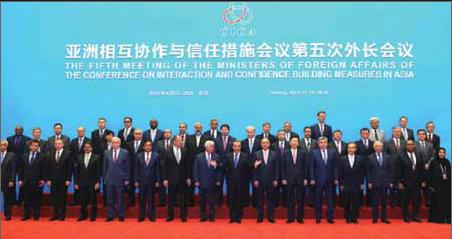Security for All
2016-05-16ByBaiShi
By+Bai+Shi


When the fifth meeting of the ministers of foreign affairs of the Conference on Interaction and Confidence Building Measures in Asia (CICA) opened in Beijing on April 28, Chinese President Xi Jinping called for continuous efforts to build a common, comprehensive and sustainable Asian security architecture on the basis of cooperation.
In his speech at the opening ceremony, Xi said peace and stability are the common aspirations of all Asian people. While economic growth and regional integration have seen Asias place in the world rising, still, there are both conventional and unconventional challenges to Asias security. They include regional conflicts and terrorism. Against such a backdrop, Asian countries need to work side by side to strengthen regional security.
He also stated Chinas stance on the Korean Peninsula nuclear issue. Reiterating Chinas adherence to the UN Security Council resolution, he said China was committed to the Korean Peninsulas denuclearization. “As a close neighbor, we will never allow war or chaos on the peninsula, as this serves nobodys interests,” Xi said. He urged all parties involved to exercise restraint, avoid provocation, and find a way back to the dialogue and negotiating table at an early date.
With regard to the tensions in the South China Sea, the president said China is dedicated to peace and stability in the region. While firmly safeguarding its sovereignty, rights and interests, China is willing to peacefully resolve the disputes through friendly consultations and dialogue with the countries directly involved.
China will work with Southeast Asian nations to make the South China Sea a region of peace, friendship and cooperation, Xi added.
What is CICA?
The CICA was established in 1992 as a forum for dialogue, consultation and promotion of confidence-building measures. It now has 26 member states, seven observer states and four observer international organizations.
At the Fourth CICA Summit in Shanghai in 2014, China assumed chairmanship of the institution for the first time. The tenure was to expire this year. At the fifth CICA foreign ministers meeting, member states spoke highly of Chinas efforts and agreed to extend Chinas chairmanship till 2018.
The fifth CICA foreign ministers meeting centered on promoting security through dialogue. About 40 delegations from CICA member states, observer states and international organizations attended the two-day meeting.
Currently, Asia faces many security challenges: terrorism, poverty, territorial disputes, nuclear proliferation and other unconventional threats. The CICA is a multilateral dialogue platform for all Asian countries to discuss security-related issues.
Can it serve as an intergovernmental organization to arbitrate in regional affairs?
“The CICA is not a place to resolve concrete issues. It seeks to find a common understanding of security and tries to build an architecture that can be comprehended and accepted by all countries in the region,” Gui Congyou, Director General of the Department of European-Central Asian Affairs under Chinas Foreign Ministry, said ahead of the meeting.
“There are many complicated problems and deep-rooted conflicts in Asia. These issues are [all] different. How to resolve them? First, Asian countries should find a common ground,” Gui said.
The official pointed out that at the CICA Summit in Shanghai two years ago, Xi had proposed that the CICA become “a security dialogue and cooperation platform for all of Asia, from which countries can explore the possibility of creating a regional security framework.”
Chinas role
At the Shanghai Summit, the Chinese president also said China is willing to take a leading role in exploring the creation of a“code of conduct for regional security and an Asian security partnership program.”
As the chair of the CICA, China has been coordinating with all parties to implement action plans in military, politics, economy, culture and environment areas. The CICA has been strengthened institutionally and its influence expanded.
But the work to build a common security architecture for Asia should not be limited to governments. So the first annual meeting of the CICAs nongovernmental forum was held in Beijing in last May, when diplomats, scholars, media outlets and nongovernmental organizations took the opportunity to exchange ideas on security and development.
Security cooperation is easier said than done. China chose to start the work with cultural exchanges and economic cooperation. Last year, China hosted the first meetings of the CICA youth commission and the CICA industrialists commission in Beijing. The two meetings helped to narrow differences in highly sensitive security perspectives.
Asian civilizations are diverse and the development gap between Asian countries is wide. Building a common understanding of security needs dialogue among all nations concerned.
